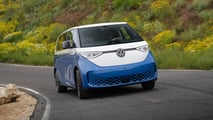
- Volkswagen dealers in the United States will get more ID. Buzz units if they sold many ID. 4 EVs.
- At first, most dealerships will only have one or two units in inventory.
The Volkswagen ID. Buzz managed to live up to its name and has generated a lot of, well, buzz, but not necessarily for the right reasons. Last month, when the official pricing for the United States was announced, people were mad.
With a starting MSRP of $61,545 for the base model with rear-wheel drive and 234 miles of range and over $70,000 for the posher First Edition model with all-wheel drive and 231 miles of range, the ID. Buzz will become Volkswagen’s most expensive model in the U.S. when it lands at dealerships closer to Thanksgiving.
But even if you desperately want to buy one, you might have to ask around more than you would normally do with other EVs. That’s because VW will send ID. Buzz EVs to American dealerships based on their sales success with the U.S.-made ID.4. The more ID.4s sold in the past, the more ID. Buzz vans in inventory.
At first, each VW dealer will get one or two units for the vehicle’s launch, according to Andrew Savvas, the automaker’s head of U.S. sales who spoke with Automotive News. Then, a “quite tight” ramp-up will follow, but the number of EVs in inventory will be based on the dealership’s market, along with prior ID.4 sales performance.
"We want to obviously give the cars to the dealers who did a wonderful job on ID.4," Savvas said.
That’s all well and good, but the ID.4 is currently subject to a stop-sale because Volkswagen is trying to figure out how to fix nearly 100,000 units with faulty door latches that could open while driving if water reached the electronics. That fix is still in the works and might only come early next year, leaving Volkswagen with just the ID. Buzz on sale–from November.
Gallery: US-Spec 2025 Volkswagen ID. Buzz LWB







The reimagined all-electric microbus is built in Germany, so it’s not eligible for the $7,500 tax credit when purchasing, although it might qualify for the incentive when leasing. This could, coupled with the fact that the electric van is already two years old, make the German automaker’s job harder, but Pablo Di Si, Volkswagen Group of America’s CEO, doesn’t seem to be worried about it.
"The car will sell extremely well for the first two years," Di Si told Automotive News earlier this week. "Then you need to have innovations and different versions, that we have in the books, and you need to keep it interesting, need to keep it lively."







